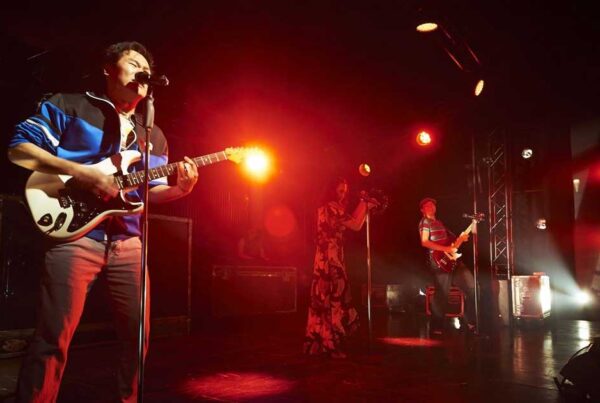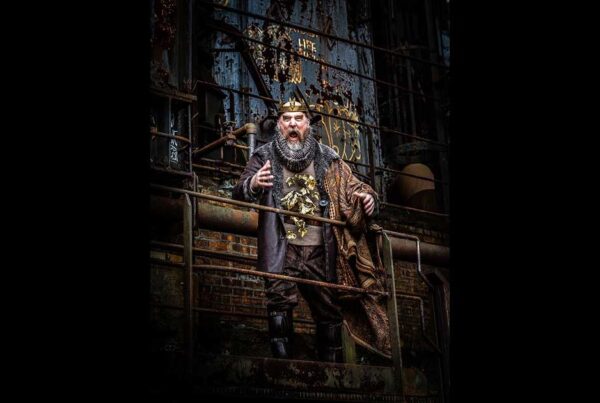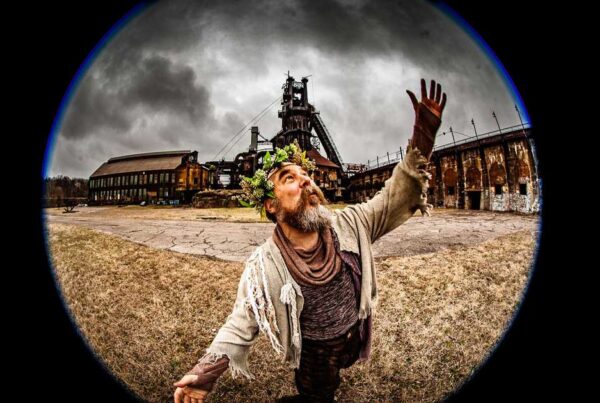
The Theatre Times – Susan Tsu is an advocate for educating costume designers and devotes much of her time to her students as University Professor and the Bessie F. Anathan Professor of Design at Carnegie Mellon University. Susan has won many awards for costume design, including the Irene Sharaff Lifetime Achievement Award, the LA Distinguished Designer Award, and the Carol R. Brown Established Artist Award. She is a Fellow of the USITT Institute. Susan has curated many international costume design exhibitions including the upcoming Innovative Costume of the 21st Century: The Next Generation, opening in Moscow at the State Historical Museum this June. Alyssa Ridder had an opportunity to interview Susan about her work on an upcoming production of King Lear with Quantum Theatre which features a compelling site-specific setting in the Carrie Blast Furnaces outside of Pittsburgh, PA.
Alyssa Ridder: What can you tell me about your production of King Lear?
Susan Tsu: Well, first of all, Quantum Theatre is a really neat theatre in Pittsburgh because every time they do a show it’s in a different place. The thing that’s really cool about people who go to see Quantum shows is that they tend to be adventuresome. They tend to like surprises and like going to unusual places and experiencing things that they’ve never experienced before. King Lear is going to take place at Carrie Furnace. It is a decommissioned steel foundry where the steel was melted down into molten stuff and poured into other forms. The foundry itself is a monolithic being. You feel the power of it even though it’s not operating anymore. I think the fact that they’ve kept Carrie Furnace alive for the public is really important. It is a living museum that helps us remember some of Pittsburgh’s past.
Alyssa Ridder: How do you approach a show once you get a script?
Susan Tsu: I dream about the play and identify the major themes that I think are within the play and then contemplate what those themes say within our world today, and how they are relevant both to me first, as a person, but then within the context of our society. I think that designers can be conscience-prickers and vehicles for change. Through the kinds of social-political interpretations that we make, people can think about choices within our society, aspects of humanity, and reasons why human beings do both generous and horrific things to each other, and they can hone their points of view about such things.
Alyssa Ridder: What does King Lear mean to you?
Susan Tsu: Well King Lear is a play I’ve done four times. And it’s interesting because as a younger designer I think I related more with the sisters and now as an older designer I relate more with Lear. I think that it’s a beautiful play because it does ask some of the bigger questions in life, like what is life worth, and how does one define oneself? Is it only from exterior sources or is it more powerfully from within? I personally don’t think that Lear necessarily goes mad in a crazy kind of way. I think he’s driven a little crazy by the way his daughters begin to marginalize him and to wrest power from him and not be gracious about it. I think that that is something that almost every family will have encountered at some point or another. For me, it will always remain one of the most meaningful and profound of Shakespeare’s plays.
Alyssa Ridder: Do you think that setting King Lear in the Carrie Blast Furnaces brings a new kind of meaning for the audience?
Susan Tsu: Everybody who comes to see the show will have the giant, massive form of the Carrie Furnace behind them. I’m sure that it will have a varied effect on people who go there, depending on the history that they already bring with them. Many will remember when the steel industry really guided us when there was soot on the windows and all the buildings downtown were black and we led the world in steel production. There’s a certain sense of pride because of what Pittsburgh has been in the past and what it has meant to the world. It used to be called “hell with the lid off!” It is an industry that made the steel magnates great fortunes while working many, many people to the bone. The steel industry is pretty much gone in Pennsylvania now and I think there are probably some differing opinions on whether steel manufacturing can really, truly come back. I’m sure there is going to be, actually, a sense of loss for the audience even before the play begins.
Alyssa Ridder: How do your designs communicate that sense of loss?
Susan Tsu: I feel that at the beginning of King Lear it is important to show everything that he has within his kingdom in terms of land and power in order to be able to strip it away by the end of the play. Some of the first thoughts I had were that Lear should come in with a giant cape and on top of that cape was all of his wealth. Then I started thinking about the practicality of it and about what all of his wealth and power might mean metaphorically. So now, King Lear is going to have a 19-foot train which is basically a cape that is formed from the shape of England at the time. And I’m hoping that he will drag it on in a really kind-of labored way. It’s heavy and it’s hard to drag on, and he has to have help doing it. And then, by the end of the play, he becomes his purer self, the essential person inside, without the trappings of what it means to be powerful or wealthy. He and Cordelia will be in white, in each other’s arms, in simple, long gowns. And he’ll have this beautiful felted panel made by one of the craft artisans who sell at the Pittsburgh Center for the Arts. It will be a beautiful and tragic Pieta moment of clarity, love, and loss…




